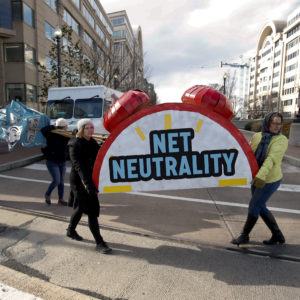Fight for the Future (FFTF), a left-leaning think tank that supports net neutrality, believes the issue will drive voters to the polls next week. But they don’t appear to have data on their side.
FFTF is partnering with local groups to host net neutrality town halls in 24 swing districts across the nation the week before midterm elections. Their goal is to get out the vote for candidates (overwhelmingly Democrats) who support overruling the FCC and the reinstating Obama-era net neutrality rules.
Anthony Damore, a Florida resident who plans to attend a local town hall hosted by Palm Beach Tech and other groups said in a FFTF press release, “I plan to attend the Tele-town hall and make sure Congressman [Brian] Mast (R-FL) knows why supporting net neutrality means supporting an Internet that prioritizes people over corporate interest, that videos and music aren’t subject to fast lanes and slow lanes ensuring only those with money get heard. Without net neutrality smaller companies would be helpless trying to keep their businesses afloat and turn a profit. Net neutrality ensures we all have a voice.”
But there is no data to indicate that net neutrality is a priority for midterm voters. In fact, the Brookings Institution found that the top three issues for Floridians this year are health care, immigration and guns, respectively. Net neutrality didn’t even make the list.
Furthermore, the American Enterprise Institute’s (AEI) Roslyn Layton, a visiting fellow specializing in tech policy, recently released a study finding that net neutrality rarely, if ever, motivates voters to go to the polls. “Surveys and conventional wisdom on elections suggest that voters focus on top line issues such as the economy, education, health care and security,” Layton found.
A recent poll by the Henry J. Kaiser Family Foundation (KFF), which focuses on health care policy, found that health care, gun policy and immigration are the top three issues for voters this year respectively, followed closely by tax reform and foreign policy. Neither net neutrality nor tech policy in general have emerged as key issues, despite recent scandals surrounding Silicon Valley’s handling of personal data.
Part of the reason for this, Layton argues, is that net neutrality and privacy issues are difficult to define.
“When asked open-ended questions, such as how to define net neutrality and how to regulate it, a leading poll suggests that as many as 75 percent of Americans have not heard of the topic or cannot explain it,” Layton says, citing a 2015 Hart Research study. “While there may be general support among Americans to protect the internet … and specific support for net neutrality among millennials, there is not necessarily an agreed definition or preferred policy instrument.”
And yet, she notes, Democratic insiders and left-leaning think tanks are still trying to make net neutrality a key midterms issue. Layton quotes Senator Chuck Schumer, who said “If our Republican friends don’t wise up and join us, Democrats will be making net neutrality a major issue in the 2018 elections, and we will.”
“Democrats are out of touch with what the electorate cares about. What Democratic voters do care about is health care,” Layton told InsideSources.
The Center for Democracy and Technology, which also supports net neutrality, thinks FFTF’s town halls are sending a message to Congress and encouraging voters to vote their values.
“The vast majority of people across the political spectrum support net neutrality and understand that access to the internet plays a critical role in their daily lives,” Open Internet Counsel Stan Adams told InsideSources. “Net neutrality is good for individuals, small business, and the broader economy. These town halls are an excellent opportunity to remind members of Congress that Americans expect it to take action to protect net neutrality.”

